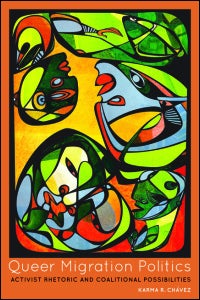 Fembot’s Books Aren’t Dead (BAD) interview for April 2014 is now available on the Fembot website. In this BAD interview Magie Ramírez (Ph.D. Candidate, University of Washington) talks with Karma R. Chávez (Assistant Professor, University of Wisconsin-Madison), author of Queer Migration Politics: Activist Rhetoric and Coalitional Possibilities (Champaign, IL: University of Illinois Press, 2013).
Fembot’s Books Aren’t Dead (BAD) interview for April 2014 is now available on the Fembot website. In this BAD interview Magie Ramírez (Ph.D. Candidate, University of Washington) talks with Karma R. Chávez (Assistant Professor, University of Wisconsin-Madison), author of Queer Migration Politics: Activist Rhetoric and Coalitional Possibilities (Champaign, IL: University of Illinois Press, 2013).
You can listen to this interview at: http://fembotcollective.org/blog/2014/04/01/books-arent-dead-queer-migration-politics/
Both the podcast and the transcript for this interview (as well as BAD’s past interviews) will be available for download in the near future. BAD is Fembot’s series of monthly interviews with feminist authors of recent books on media, science, and technology. For those who are interested in participating in the ongoing BAD project please contact the BAD editor, Hye Jin Lee (hye-jin-lee@uiowa.edu) or Carol Stabile (cstabile@uoregon.edu).
About Queer Migration Politics: Activist Rhetoric and Coalitional Possibilities:
The battles for LGBTQ rights and immigrant rights have captured significant attention in the U.S. public sphere throughout the twenty-first century. Both movements, which are largely understood to be separate, have advocated a politics of inclusion in and assimilation to mainstream national values. Delineating an alternative approach to activism at the intersection of queer rights, immigration rights, and social justice, Queer Migration Politics examines a series of "coalitional moments" in which contemporary activists discover and respond to the predominant rhetoric, imagery, and ideologies that signal a sense of national identity.Karma R. Chávez analyzes how activists use coalition to articulate the shared concerns of queer politics and migration politics, as activists imagine their ability to belong in various communities and spaces, their relationships to state and regional politics, and their relationships to other people whose lives might be very different from their own. Advocating a politics of the present and drawing from women of color and queer of color theory, this book contends that coalition enables a vital understanding of how queerness and immigration, citizenship and belonging, and inclusion and exclusion are linked. Queer Migration Politics offers activists, queer scholars, feminists, and immigration scholars productive tools for theorizing political efficacy.

